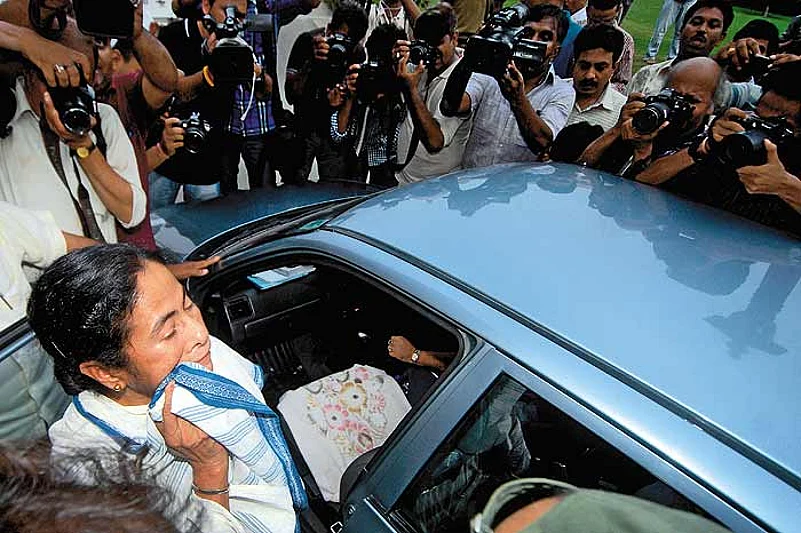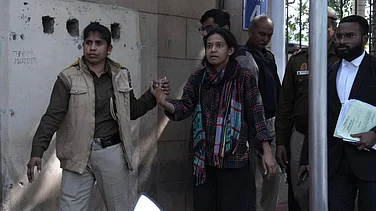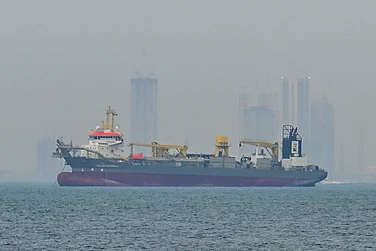Approved Reading
- Bengali Sakalbela, Ekdin, Sangbad Pratidin, Khabar 365 Din, Dainik Statesman, Aajkal, Kolom (a periodical yet to be published)
- English The Times of India
- Hindi Sanmarg
- Nepali Himalaya, Darpan
- Santhali Sarsagan (periodical)
- Urdu Azad Hind, Akhbar-e-Mashriq
***
The tempest that is Mamata Banerjee’s temper has shifted its gaze from the UPA-II and the railway budget, its thirst slaked by the overturning of the proposed hike in fares. The press in Bengal is now in the eye of the storm. Last week, the Trinamool chief struck at some of the most influential dailies of east India—Anandabazar Patrika, Bartaman and The Telegraph—when she ordered state-funded libraries to subscribe only to a limited list of newspapers and periodicals which did not include them. Though the move is hardly going to hit circulation, the sting lies in the symbolic act of displeasure.
Expectedly, the CPI(M) lost no time in terming it undemocratic. “The decision is reminiscent of the pre-Emergency scenario, when the press was stifled,” CPI(M) leader Mohammed Salim told Outlook. “Mamata Banerjee entered politics at the time of the Emergency. That is her grooming, and moves like this come from her natural instinct,” he added.
The state Congress too didn’t waste this unexpected ball at its feet. “I condemn this decision,” Congress leader Adhir Chowdhury told Outlook. “The media is the fourth pillar of a democracy; clamping down on it is tantamount to acting in a dictatorial manner.”
Initially only eight newspapers were included in the approved list, but later it was revised to 13 after an uproar from the opposition in the assembly. Significantly, the fiat targeted the ABP group, the biggest media house in the eastern region. Both their English and Bengali dailies, The Telegraph and Anandabazar Patrika—the latter is the highest selling Bengali language newspaper—have been dropped from the list. Their exclusion in the list is ironic, for they had bent over backwards to support Mamata and the TMC when it took on an arrogant Left Front. But almost a year after Mamata’s ascension to the CM’s seat, dismay at her capricious style of governance are clearly reflected in criticism in newspapers. Sources close to Mamata say she sees The Telegraph and Anandabazar Patrika as pro-Congress and anti-Trinamool. It is possible that she suspects that the ‘offensive’ newspapers are being controlled by the Congress in New Delhi.
Bartaman, which has the second highest circulation in the region, has also been dropped for similar reasons. Anindya Jana, political bureau chief of Anandabazar Patrika, told Outlook: “If you look closely, you’ll notice that none of the papers in the approved list of publications has been critical of the government. We would like to believe that the intentions were not to throttle the voices of criticism, but it’s hard to do that. I don’t think this is mere coincidence.”
Mamata has ingenious explanations of her own. On the one hand, she said it was a cost-cutting exercise, on the other she claimed to be helping the smaller papers with less financial clout. This, incidentally, includes the Times of India (included in the revised list)—a paper hardly in need of state assistance.
Ekdin, a Bengali daily with a growing circulation, has been included in the kosher list. Those favoured thus find themselves in the embarrassing position of being described as TMC supporters. In a strongly worded article, Ekdin editor Suman Chattopadhyay refuted such allegations: “We do not know why our name was included...in the government circular...we have never solicited such inclusion.” He told Outlook, “We are not going to criticise for the sake of criticism. We don’t subscribe to the view that whatever is anti-monopoly, anti-conglomerate or not pro-industry must be anti-national, anti-state and regressive.”
Still, it can’t be ignored that three of the listed papers are owned by individuals who have recently got Trinamool Rajya Sabha tickets. Right now, a peevish Mamata appears to have acted in a partisan manner. The issue will gain in bite and venom if the approved papers start cornering all government advertisements.






















